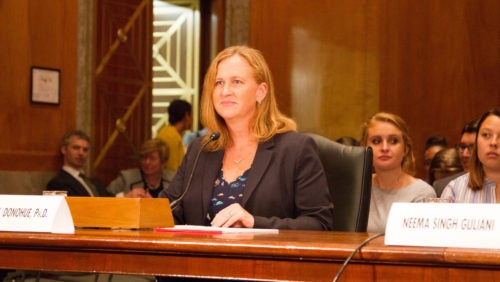Georgetown Law Professor Laura Donohue Testifies Before Congress on Warrantless Smartphone Searches at the Border
July 17, 2018

Georgetown Law Professor Laura Donohue testified before Congress at a July 11 hearing on warrantless smartphone searches at the border.
“This is an area in urgent need of congressional action,” says Georgetown Law Professor Laura Donohue, who recently testified before Congress on the topic of warrantless searches of electronic devices at U.S. borders.
The July 11 hearing was conducted before the Senate Subcommittee on Federal Spending Oversight and Emergency Management, Committee on Homeland Security and Government Affairs — with Sen. Rand Paul (R-KY), Ranking Member Gary Peters (D-MI) and others. Donohue, Georgetown Law’s director of the Center on National Security and the Law and director of the Center on Privacy and Technology, was the first expert of the day to testify.
As Donohue explained, border searches of electronic devices are rapidly increasing, with U.S. Customs and Border Protection (CBP) examining more than 8500 electronic devices in 2015. By 2017, the numbers had soared to more than 30,000 searches. U.S. Immigration and Customs Enforcement (ICE), meanwhile, searched more than 4400 phones and 320 devices in 2015. In 2016, ICE searched more than 23,000 devices.
The Supreme Court has recognized that cell phones reveal far more information than a search of an individual’s wallet or purse, she noted. As the Court in Riley v. California recognized, even the term “cell phone” is misleading: phones are computers with an immense storage capacity and contain “more information that can be ascertained from the search of your home,” Donohue said.
Yet CBP’s January 2018 guidelines allow for basic searches without suspicion, and for advanced searches, officers must meet a standard of “reasonable suspicion”— not probable cause.
“This means that the Executive Branch could seize the phones, iPads and laptops of every member of this committee, those of your staff, your spouses, and your children, whenever entering or leaving the United States — without any suspicion of wrongdoing,” Donohue said, noting that there are no statutory limits on who can see this information, how long it can be kept or how it can be used. “And there is no special protection provided for sensitive political material, client-attorney privilege, trade secrets, medical information or materials otherwise privileged at law.”
The equivalent ICE directive, meanwhile, has not been updated since 2012. “Like its counterpart, it pertains to any item containing electronic or digital information, but unlike its counterpart, ICE authorizes agents to search, detain, seize, retain and share electronic devices and information with or without individualized suspicion,” she said. “At any point during a border search, electronic devices, or copies may be detained for further review either on or off site. They can be kept for 30 days and extended at 15-day intervals thereafter.”
Innovation and the Fourth Amendment
“As Chairman Rand Paul recognized when he introduced the Protecting Data at the Border Act, ‘[I]nnovation does not render the Fourth Amendment obsolete,’” Donohue noted.
The Supreme Court’s recent decision in Carpenter v. United States — in which Donohue’s scholarship was cited five times by Justice Clarence Thomas—underscored the sensitivity of the information that can be gleaned from cell phones. Regarding locational data alone, “it’s specific. It’s retroactive. It’s extensive, going back multiple years. It’s precise. It’s deeply revealing. And it’s easy, cheap and efficient to access,” Donohue said. “Mobile phone data is different in kind than other kinds of records. And it is different in kind than what we pack for a trip to Australia.”
Lower courts, however, are reaching disparate conclusions. And CBP and ICE have been largely left to determine for themselves whether and to what extent they can search travelers’ devices. Donohue noted that in Riley, the government asked that it be allowed to develop its own protocols to address the privacy questions posed by mobile phones and cloud technologies. The Court rejected the offer, observing, “the Founders did not fight a revolution to gain the right to government agency protocols.”
“The Founders fought for rights — rights that are now endangered by the government’s border search of electronic devices,” Donohue wrote in her formal remarks. “The time is ripe for this committee to take action.”